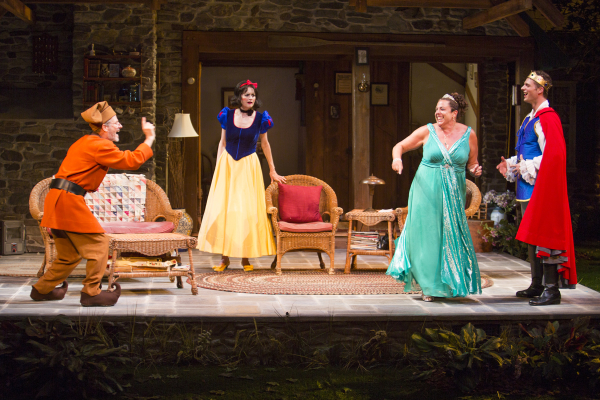Vanya and Sonia and Masha and Spike
Christopher Durang’s play trades on his characters’ longings and regrets as much as the comic allusions to Chekhov.

(© Jim Cox)
The year 2014 belonged to Vanya and Sonya and Masha and Spike, Christopher Durang's 2013 Tony Award-winning play, with productions on the boards at 27 regional theaters. The Huntington Theatre Company's spot-on take has been imported to Boston from the Old Globe Theater in San Diego with its splendid cast and Jessica Stone's direction intact.
Stone's production, which is based on the original Broadway direction by Nicholas Martin, burrows into the subtext of the play and mines it for the characters' fears. Named by their academic parents after people in Chekhov's plays, Vanya, Sonia, and Masha are terrified of aging, fed by the realization that the best of their lives has passed by.
The play opens on Vanya (Martin Moran) and his adopted sister, Sonia (Marcia DeBonis), taking morning coffee on the terrace of their parents' lovely home in Bucks County, Pennsylvania (set design by David Korins). While they're complaining that nothing ever happens, housekeeper Cassandra bursts in and warns them to beware of guests in the offing. Cassandra, in a high-energy, hysterical performance by Haneefah Wood, also claims she is psychic and looks as if she has strayed into modern times from fifth-century Athens.
The prophecy ushers in Masha (a comically frantic Candy Buckley), the third sibling. A famous movie star, narcissist, and veteran of five failed marriages, she arrives trailed by her much younger stud-of-the-moment, Spike (a hunky Tyler Lansing Weaks). Spike is a wannabe actor who strips down to his briefs at every opportunity. "Why does he keep taking off his clothes?" Vanya asks. "Because he can," Sonia answers.
Masha has come home to attend a neighbor's party where she intends to wear a vintage Snow White costume, with Spike as Prince Charming. She has also brought dwarf costumes for Vanya and Sonia to serve as her attendants. Nina, the neighborhood nymphet and threat to the Norma Desmond-like Masha, drops in and agrees to go with them as Dopey, complete with floppy ears and long robe.
However, by Act 2, we learn that Sonia was the hit of the party, outfitted in a spangled gown as Maggie Smith in the role of the film's Evil Queen—not Masha. Later, when Nina reads the lead character of a molecule in Vanya's experimental drama (think Treplov's play in The Seagull), Masha loses it and announces that she intends to sell the house (and the tiny cherry orchard) that she has been maintaining, thus provoking frightened protests from her siblings.
Part of the joy onstage at the Huntington lies in the physicality of the cast, which piles on the sight gags, gestures, and body language, echoing Martin's directing sensibility. Stone's illumination of the characters' insecurities is underlined by a poignant DeBonis during an unexpected phone call late in Act 2. And later, it comes to light again in Moran's exquisite rants about the security of the past, a time when, "we licked postage stamps and watched The Beatles on the Ed Sullivan Show."
In the end, when all the reminders of Chekhov are used up, and the plot contortions have run their course, what remains is home and family. If the outcome is sentimental, so be it. One suspects that Vanya and Sonia and Masha and Spike will continue its march across American stages for a long time to come.








